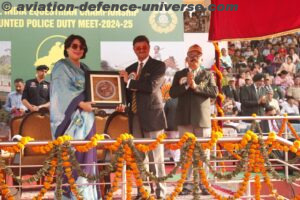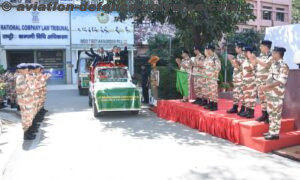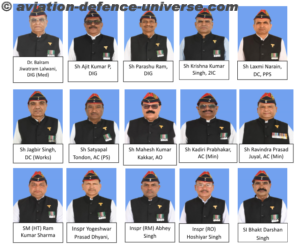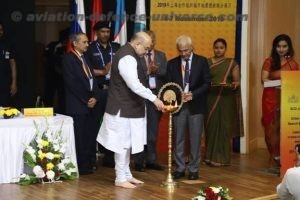
New Delhi. 05 November 2019. The Indian Minister for Home Affairs, Amit Shah inaugurated the Shanghai Cooperation Organization (SCO) Joint Exercise on Urban Earthquake Search & Rescue (SCOJtEx)-2019 . The Exercise is being organized by the National Disaster Response Force (NDRF) from November 4-7, 2019. The exercise is the outcome of 9th Meeting of the Heads of Government Departments of SCO countries dealing with the prevention and elimination of emergency situations in Kyrgyzstan during 2017, in which India offered to organize the next Annual Disaster Management Exercise for the region.
Addressing on the occasion, the Home Minister extended warm greetings to all delegates from the SCO Nations that have come together to participate in the joint exercise. He said that their presence for this exercise represents their governments’ passion and commitment to make this exercise a success. He informed that India attaches special importance to SCO as an excellent platform for synergizing the efforts of all member States in the field of multilateral, political, security, economic and people-to-people interaction in the region. He also noted that SCO has emerged as an international organization as it represents 40 % of global population, 20 % of global GDP and 22% of the global geographical area.
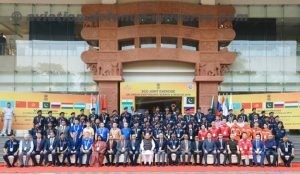
Shah said that Prime Minister Narendra Modi gave ‘HEALTH’ mantra for SCO Members for cooperation in 6 areas. He called for strengthening mutual cooperation on issues in six areas which are Healthcare cooperation, Economic Cooperation, Alternate Energy, Literature and Culture, Terrorism-Free Society and Humanitarian Cooperation.
Bringing the importance of this joint exercise in perspective, the Home Minister said that during 1996-2015, more than 3lakh people have lost their lives due to natural calamities. Earthquakes have taken more than 2 lakh lives, which account for two-thirds of disaster related mortality in SCO countries. In this background, this joint exercise will be very useful for improving the collective preparedness & building a common understanding of internationally recognized procedures to co-ordinate post-earthquake responses. He further added that this joint exercise with SCO member states will be helpful in developing personal understanding among counterpart teams when they will work together to tackle any disaster situation.
Establishing the centrality of SCO Nations in tackling disasters, Shah said that none of the global targets on reducing disaster losses- whether they are enshrined in the Sendai Framework or Sustainable Development Goals -can be met by 2030, unless achieved by the SCO countries. International cooperation in this area is, therefore very important, he emphasized.
Speaking on India’s efforts in this direction, Home Minister said that we are making concerted efforts for strengthening our response capabilities and taking focused steps. Our National Disaster Management Plan was launched in 2016. All our 28 States, 09 Union Territory and 90% of our districts have completed their disaster management plan. Now, efforts are on to revise this National Plan which has taken in to consideration not only the Sendai Framework for Disaster Risk Reduction but the Sustainable Development Goals and Agreement on climate change also, he added.
Highlighting the India’s effort to reduce preventable deaths and other losses from disaster, Home Minister cited the example of India’s effective handling of Phaillin, Hudhud and Fani in the recent past and said that this was the direct outcome of a series of policy initiatives and enhancement of early warning capabilities, advance preparation, training and capacity development. During the cyclone Fani, loss of lives was reduced to 64 persons compared to 10,000 lives in the 1999 Odisha Super Cyclone. In the other words, in a little over a decade, India has been able to reduce the loss of lives to less than 1% in the comparisons to that of past, he said.
Talking about India’s focus on disaster resilient infrastructure to minimize deaths, Shah informed that India is championing a Coalition for Disaster Resilient Infrastructure, which will be multi-hazard oriented and will also help in minimizing the losses to property and infrastructure. Prime Minister Narendra Modi launched this Coalition during the UN Climate Summit in New York. This global Coalition for disaster resilient infrastructure would address concerns that are common to developing and developed countries, small and large economies and countries that have moderate or high risk. Focus on disaster resilient infrastructure would simultaneously address the loss reduction targets under the Sendai framework, address a number of SDGs and also contribute to climate change adaptation, he added.
Shah also highlighted that India has established the Tsunami Early Warning System for the Indian Ocean RIM countries. India has launched the South Asia Geostationary Communication Satellite to improve communication, weather forecasting, etc. among the South Asian countries. He underlined that after Gujarat Earthquake-2001, the ‘Owner Driven Reconstruction for Housing’ was first implemented in Gujarat which has now been adopted by many countries after the Indian Ocean Tsunami and in Nepal after the 2015 Nepal Earthquake. Today, this project has become a globally accepted model for housing construction after a disaster, he added.
The Home Minister further said that during the Nepal Earthquake in 2015, Government of India launched ‘Operation Maitri’ and provided all types of support to Nepal including rescue, relief and reconstruction activities in the affected areas. Considering the importance of reconstruction and rehabilitation efforts, India committed assistance of US $ 1 billion for this purpose. He expressed hope that over next few days besides focusing on joint exercise, delegations will have the opportunity to share their country’s experience and acquire the skills of others as well.
During this four day long simulation exercise, there will be a Joint Urban Earthquake Search & Rescue Exercise for SCO member states, SCO experts meeting of Ministries responsible for Prevention and Elimination of Emergency Situation, followed by 10th Meeting of Heads of Departments of Disaster Prevention of SCO member States.
Delegations and response teams from SCO member Nations and representatives from Embassies/High Commissions of SCO nations in Delhi, senior officers of Government and state representatives were also present.








































